SIGNS (2002)
A former priest's beliefs are challenged when hostile aliens land on Earth.
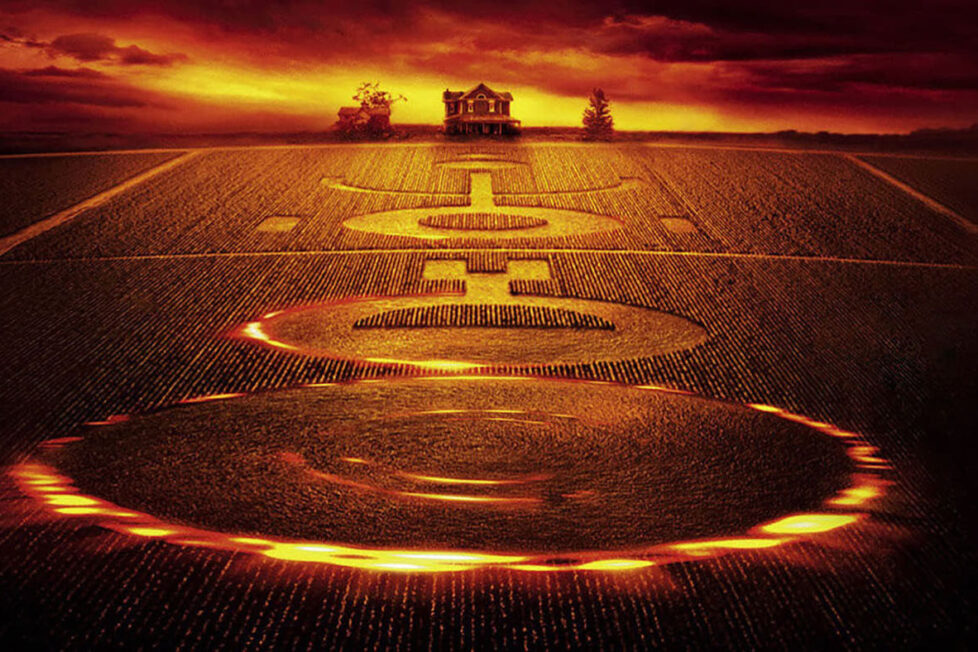
A former priest's beliefs are challenged when hostile aliens land on Earth.


Difficult as it might be to remember in the wake of Glass (2019) and Old (2021), there was a time when M. Night Shyamalan was one of the brightest hopes of commercial filmmaking. Before turning 30, Shyamalan had already dazzled audiences with the audacious mind game of The Sixth Sense (1999), followed by the accomplished if slightly samey Unbreakable (2000).
Signs is equally well-regarded by many and resembles its predecessors in terms of its confident tackling of existential dilemmas through a primarily male cast in a Pennsylvania setting. However, it doesn’t rely on an unexpected twist ending. Signs plainly poses the question ‘is life meaningful or random?’ and lays out potential answers, but it’s not nearly as insightful as its director seems to believe.
The setting and small cast of characters are established quickly and efficiently. The first thing Signs shows us is a house’s backyard, slightly distorted by the glass of a window through which it’s glimpsed, perhaps suggesting the difficulty of perceiving things as they actually are. Next, a photo shows Graham (Mel Gibson) in a clerical collar, and then we see him in person, waking up alone in bed. We soon learn he’s a widower who left the Episcopalian clergy six months ago, after the death of his wife in a road accident led to a crisis of faith. He’s now a farmer, although exactly how he managed to leave the church, acquire a farm, and grow fields of corn in such a short time is unexplained, as is the lack of farmhands to help him.
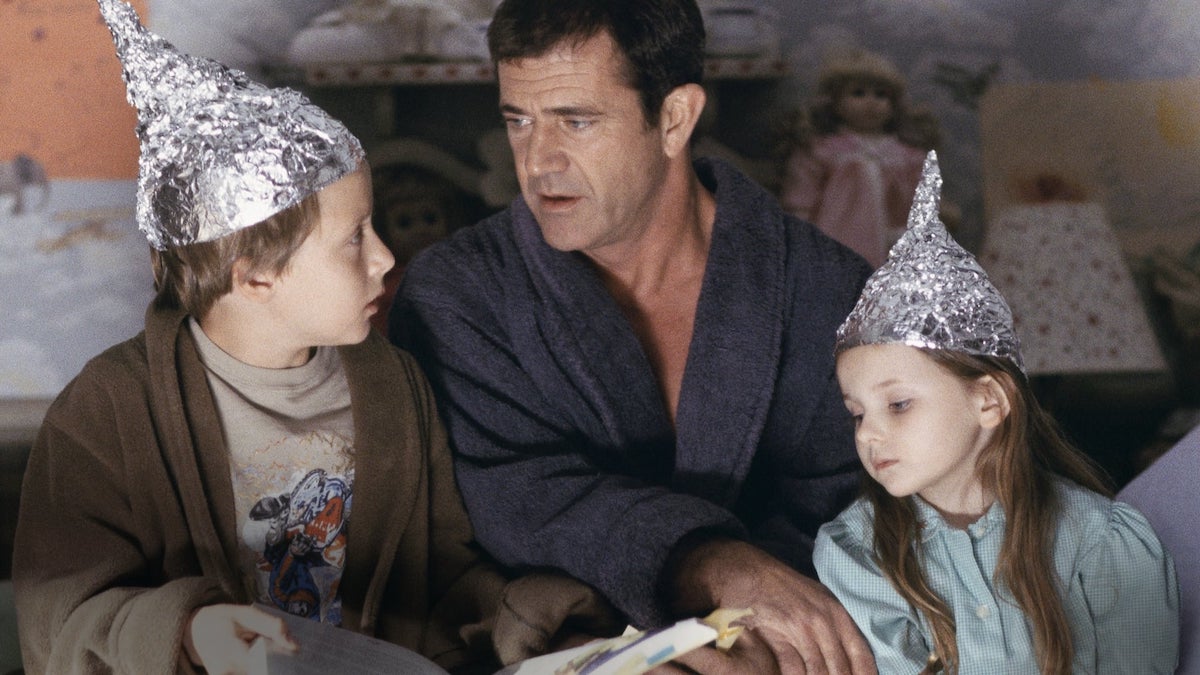
Graham moves in mysterious ways, presumably, since the only other people around are his brother Merrill (Joaquin Phoenix), a former local baseball star now reduced to working at a gas station and thinking of joining the army, along with Graham’s asthmatic pre-teen son Morgan (Rory Culkin) and younger daughter Bo (Abigail Breslin).
From early on there are hints something isn’t quite right on Graham’s farm: one of the family dogs behaves oddly, Bo says “there’s a monster outside my room”, and the general unease is intensified once huge crop circles appear in the cornfield. The corn is bent and not broken, so it’s impossible to imagine how hoaxers could have achieved it. “I think God did it,” says Morgan.
The mystery soon deepens when an unidentified intruder appears on Graham’s property at night, ascending to the house’s roof with inhuman speed, and the TV news reports similar crop circles being found all over the world. Merrill puts it down to pranksters (nerds who’ve never had a girlfriend, he says) but Morgan mentions extra-terrestrials, and he seems to be vindicated once lights appear over hundreds of cities near the crop signs. “It’s like War of the Worlds,” muses Merrill. Morgan acquires a book about aliens and regales the family with ominous predictions.
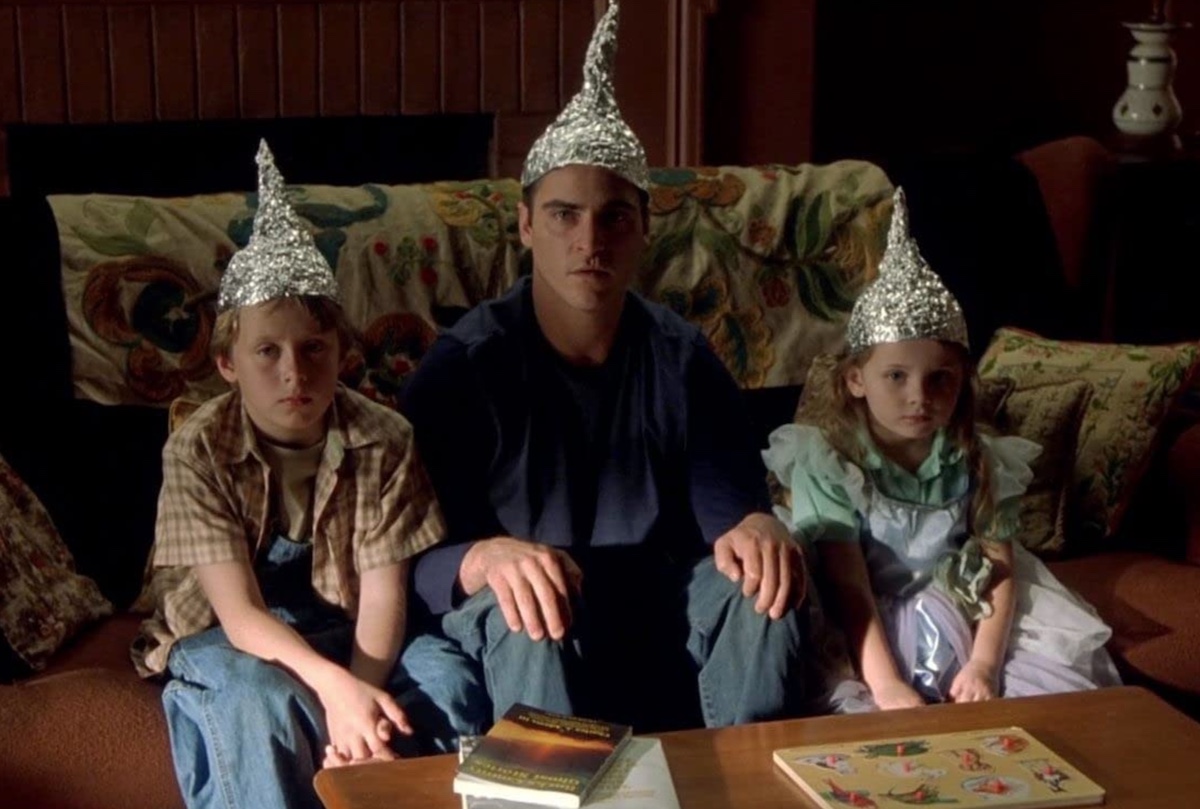
But the extra-terrestrials aren’t invincible. “They seem to have trouble with pantry doors,” observes Graham after one of them is trapped in a nearby house. And with the mystery of the crop circles solved, Signs’ focus moves to whether this family can fight the invaders off, and whether God’s on their side in the endeavour, or whether “there is no one watching out for us. We are all on our own.”
In some respects, Signs works incredibly well. Shyamalan is a master of tension and there are individually terrific scenes (the family watching the news, Merrill’s petrified yelp when the TV shows home-movie footage of an alien accidentally captured on camera in Brazil, Graham in the field at night glimpsing a limb). There’s more than a touch of Steven Spielberg in the film’s good-natured sentimentality about family too—notably in a scene where all four are holding on to each other as Morgan strives to pick up alien radio signals on an old baby monitor—and the moment where Morgan demands mashed potato for dinner may well be a reference to Richard Dreyfuss’s obsessive mash mountain in Close Encounters of the Third Kind (1977).
Phoenix makes for a fine and moody Merrill (his transition from cynicism to fear powerfully convincing, while Gibson’s performance does much less to make his character arc evident. Culkin brings whole scenes alive as the wise-beyond-his-years Morgan, Cherry Jones as a local cop has us wishing we’d seen more of her, and Shyamalan (as so often) casts himself in a small role but crucial role as the man responsible for the death of Graham’s wife and for identifying a weakness in the aliens. A rather Hitchcockian score by James Newton Howard (starting with what’s almost a full-blown overture) does much to build mood without being especially original.
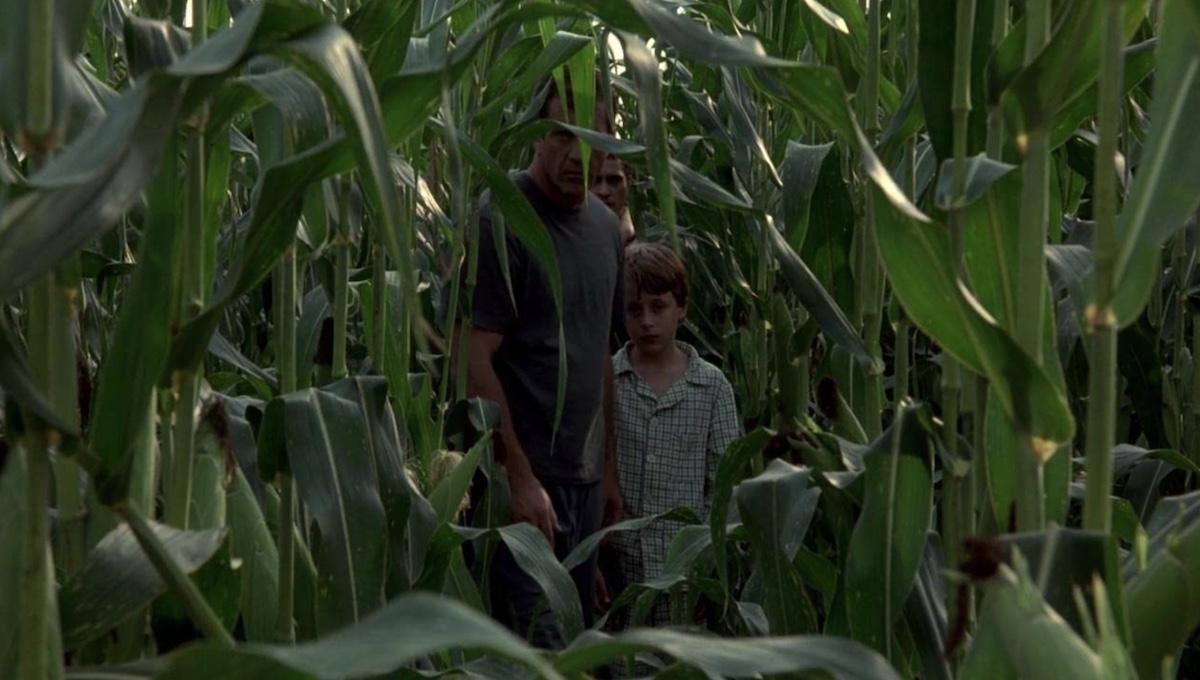
There’s a surprising amount of humour, too, and some of it’s genuinely funny: Merrill trying to persuade an unwilling Graham to use curse words, a pharmacy worker (Merritt Wever) insisting on confessing her sins to Graham despite his protests that he’s left the clergy, the kids donning tinfoil hats, a Strangelove-ish army recruiting officer, Graham’s painfully poor impersonation of a cop—though it sits uncomfortably alongside the much more sombre concerns of Signs. Indeed, it’s an example of the tone-deafness of which Shyamalan has often been accused.
But there are other, fundamental narrative flaws too—a recurring Shyamalan problem. Most blatantly, and on a literal level, the question of what Graham’s family can do against the invaders seems at best oddly parochial and at worst irrelevant. These aliens have launched their onslaught on the whole globe, not just this little corner of Pennsylvania; temporary, localised success or failure in resisting them is going to make no difference to the outcome for humanity as a whole, in which Signs (even more than most apocalyptic disaster movies) seems coolly uninterested.
Even more critical is a failure of the central thematic logic. Like both Shyamalan’s lesser-known Wide Awake (1998) and Unbreakable, Signs is focused on issues of belief and meaning. Does the world make sense? After the death of his wife, Graham’s decided it can’t, but now the events unfolding during the alien invasion lead him to reconsider that.
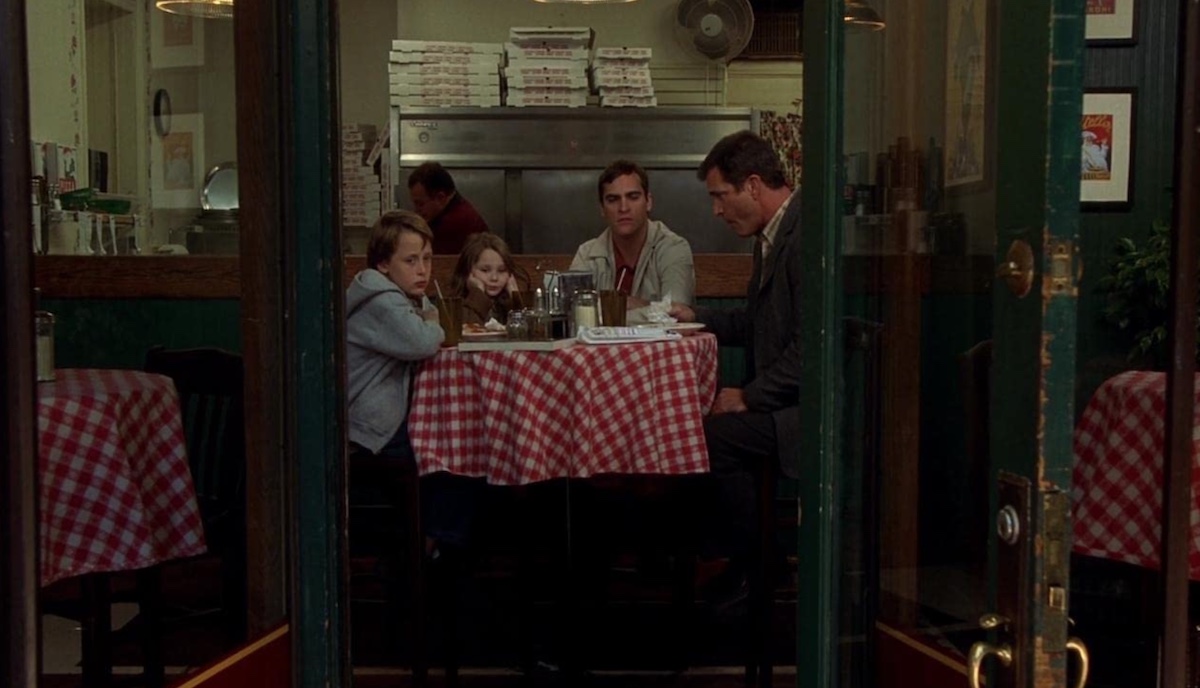
Yet none of the so-called “signs” of a divine plan is persuasive. The role played by a baseball bat and several glasses of water in defeating the aliens, for example, can just as easily be put down to coincidence. After all, many families where the mother’s dying words did not refer to a baseball bat would also own such an item and might have used it to fight off invading aliens.
So the pattern of events which supposedly pushes Graham toward rediscovering his faith is only convincing if you already believe there might be a meaningful pattern. Seen in this light, Signs doesn’t satisfactorily address the question that it claims to—whether things happen for a purpose—but instead looks like a portrayal of a man trying to deny the existence of God but doesn’t, deep down, buy into his own denial. For somebody so adamant about rejecting God, Graham seems to be persuaded to change his mind very easily.
Though much of Signs is skilfully made and absorbing, these problems seriously undermine its overall effect—much more so than the occasional dialogue clunkers that again are so characteristic of Shyamalan (no TV news script would ever say “everything they wrote in science books is about to change”, for example) or the rather 1950s-style bony, repulsive-humanoid aliens that are so much more disturbing before they’re fully seen.
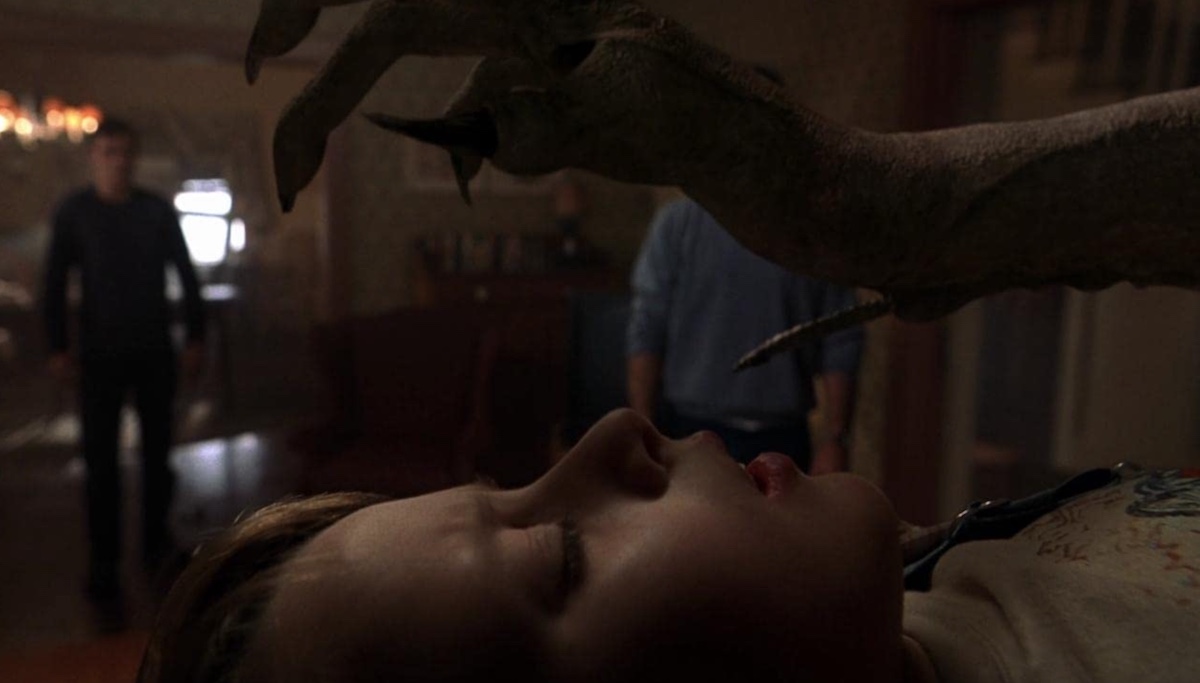
Some critics picked up on the weaknesses at the film’s heart, with Todd McCarthy of Variety, for instance, saying “Signs is all smoke and mirrors. With his third straight excursion into the supernatural, M. Night Shyamalan has begun revealing the hand that works his spooky tricks so much that the lack of substance is plainly seen. A sort of rural Panic Room with faux spiritual frosting.”
But many others were more enthusiastic. Roger Ebert said that Shyamalan “does what Hitchcock said he liked to do and plays the audience like a piano”, and doubts over its conceptual shakiness didn’t harm Signs commercially. It took the sixth position on the year’s US box office chart (higher than Ice Age or Men in Black 2), perhaps helped by the inadvertent echoes of 9/11 in its premise (if, of course, there are any coincidences…) as well as by the positive aura of The Sixth Sense and Unbreakable.
Many feel the rot set into Shyamalan’s career just a little later with the more divisive The Village (2004)—though I’d argue that one’s underrated—and certainly by the time of Lady in the Water (2006) and The Happening (2008) the lustre was wearing off his career. Perhaps, then, it’s appropriate that Signs, at the midpoint between Shyamalan’s unequivocal triumphs and his derided turkeys, displays both his undoubted mastery in handling individual scenes and the ways that he can falter so fatally by building films around grand ideas that don’t stand up to scrutiny.
USA | 2002 | 106 MINUTES | 1.85:1 | COLOUR | ENGLISH

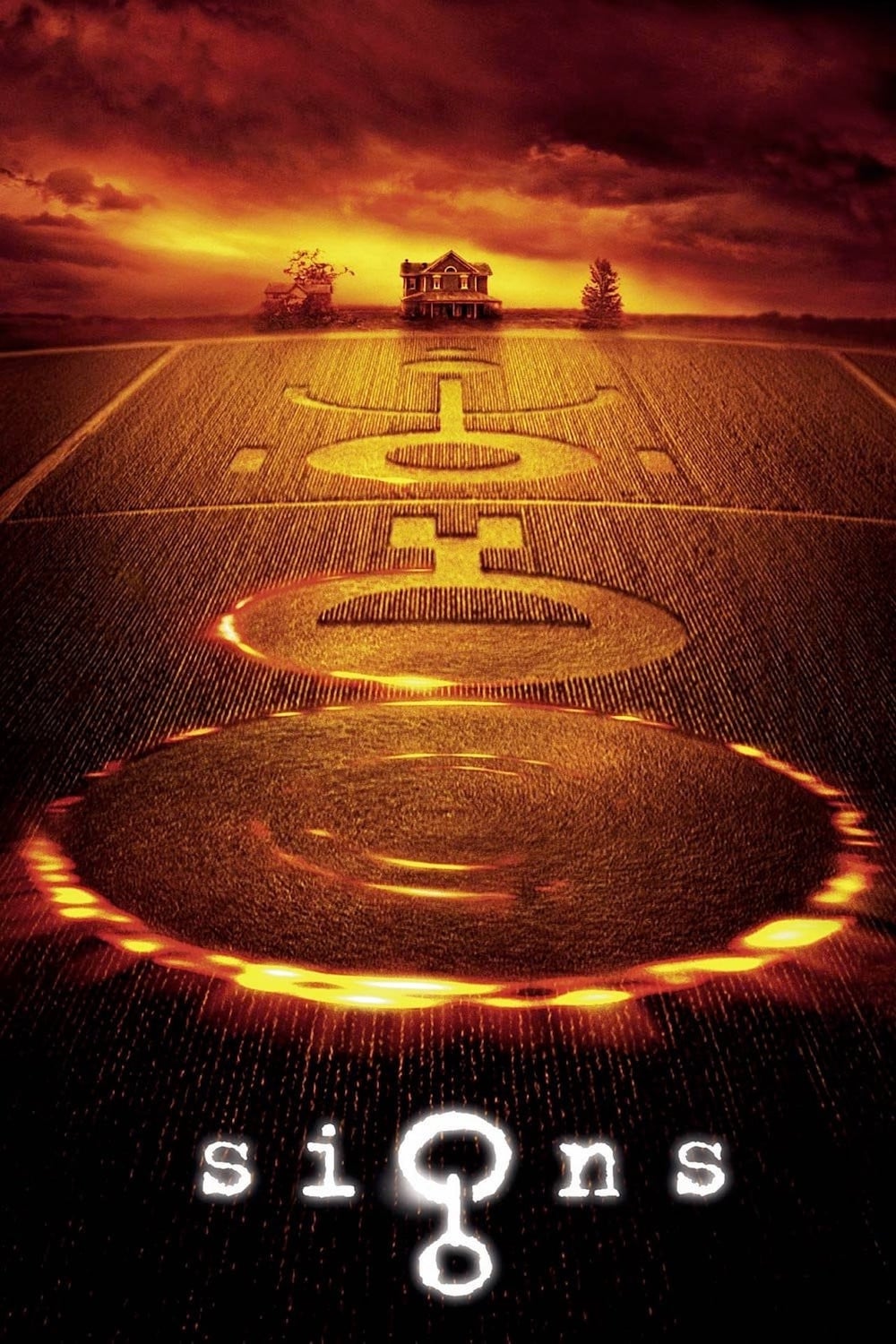
writer & director: M. Night Shyamalan.
starring: Mel Gibson, Joaquin Phoenix, Rory Culkin, Abigail Breslin, Cherry Jones, M. Night Shyamalan, Merritt Weaver & Patricia Kalember.
